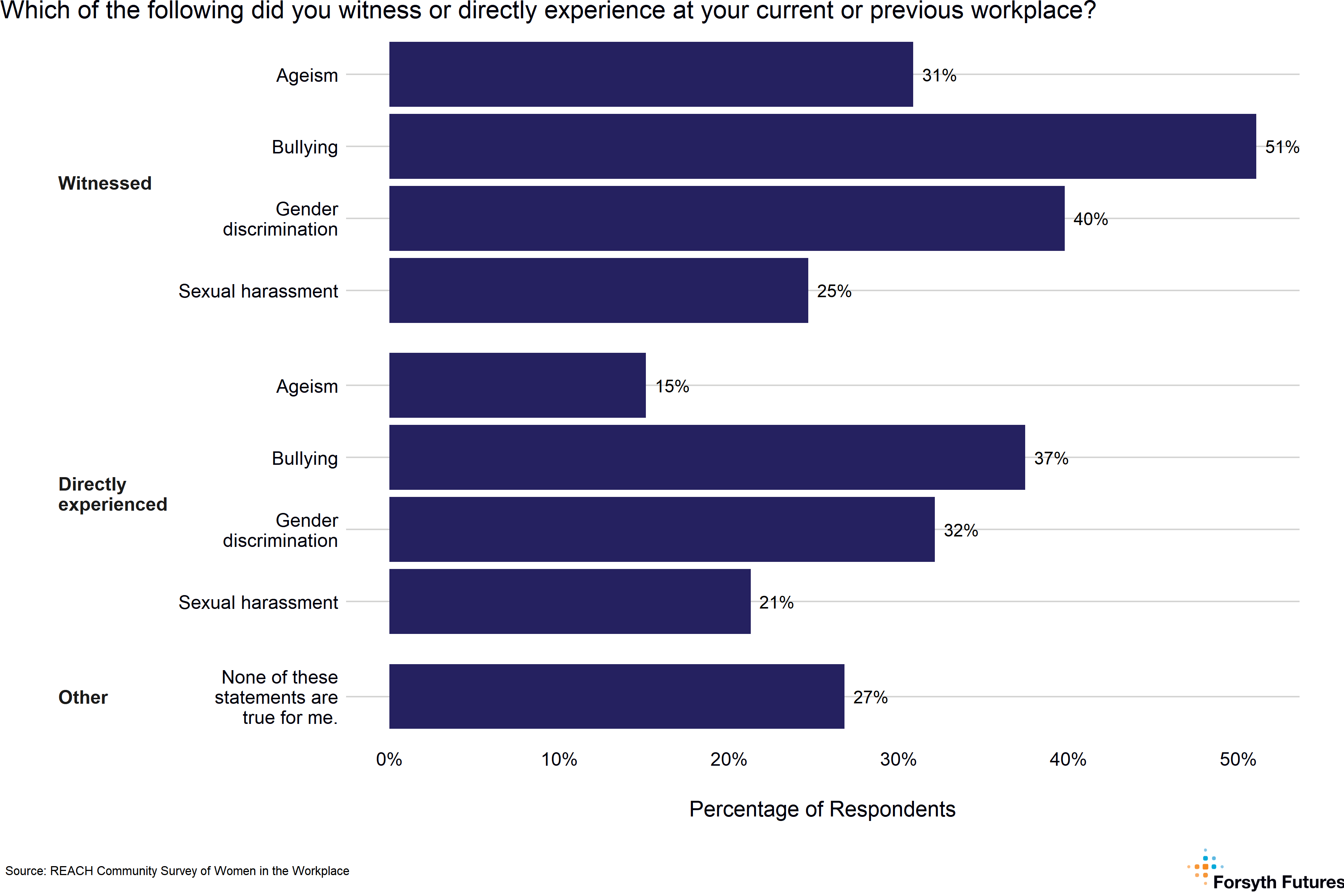Section 6 Workplace Satisfaction
6.1 Introduction
This section is broken down into four subtopics that cover women’s job satisfaction, their satisfaction with workplace benefits, experiences with discrimination at work, and the positive and negative factors affecting career advancement. Questions included in this section had varying levels of instructions for respondents; those instructions are included in the data visualizations as they were stated in the survey.
6.2 Key Findings
- Women reported high levels of satisfaction with their supervisor and organization. They also reported that their opinions were sought and valued by both their supervisor and coworkers.
- Women were less satisfied with their base salary / wage. A higher salary was identified as a top factor — alongside workplace culture — for considering a job change.
- Most women said they felt burned out at work in the past few months.
- Professional development was identified as a very important or absolutely essential workplace benefit to women;
- Affordable medical insurance coverage and mental health coverage were the top-ranked benefits.
- Women identified their gender/gender identity and childcare responsibilities as the top two factors negatively impacting their career advancement.
- Women were more likely to report witnessing ageism, bullying, gender discrimination, and sexual harassment than experiencing it directly themselves. About a quarter of women surveyed reported not witnessing or experiencing those forms of discrimination.
6.3 Satisfaction with Work
6.3.1 Introduction
This section includes survey results on respondents’ satisfaction with their employer, their job roles and responsibilities, and their employer’s approach to workplace equity. Both McKinsey & Company and Deloitte studies are referenced in the question summaries, where applicable. It is important to note that, while these studies provide some additional context, the difference in wording or question construct does not allow for direct comparison of data.
6.3.2 Key Findings
- Overall, women reported higher levels of work satisfaction. Specifically, 76% of women were satisfied/very satisfied with their organization, and another 73% of women were satisfied/very satisfied with their supervisor. Women were least satisfied with their base salary / hourly wage.
- Women reported satisfaction with flexibility regarding personal time, but they reported dissatisfaction with the number of hours they worked. They also reported being dissatisfied with the pace of their career advancement.
- A majority reported high levels of satisfaction with their employer’s commitment to workplace equity. However, when asked specifically about their organization’s hiring policies, advancement policies, and performance review process, they reported lower satisfaction.
- About 4 out of 5 women reported having felt burned out at work in the last few months.
6.3.3 Employer Satisfaction
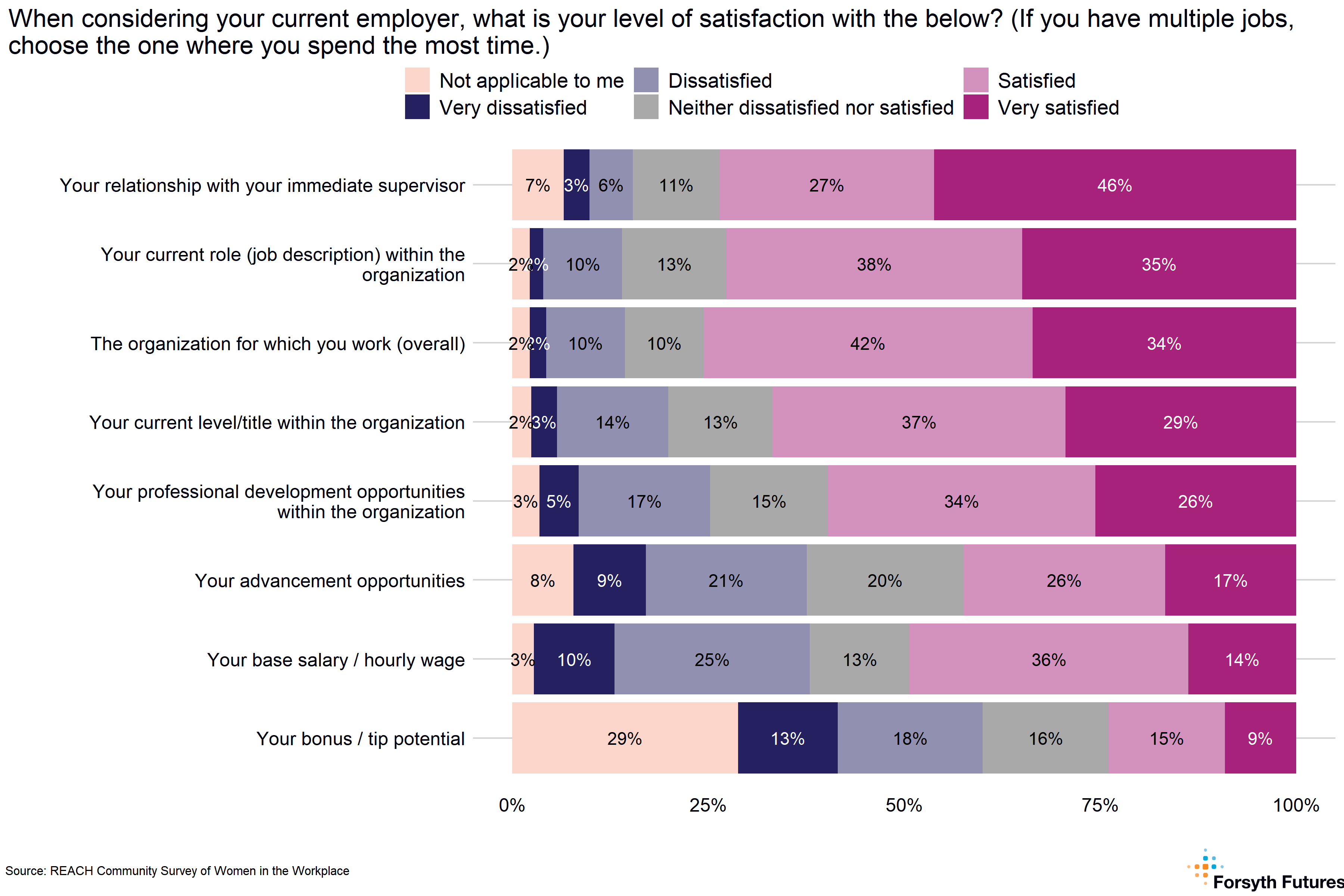
Overall, most women reported being satisfied with their current organization and their role within it. Women were the most dissatisfied with their base salary / hourly wage.
6.3.4 Job Satisfaction
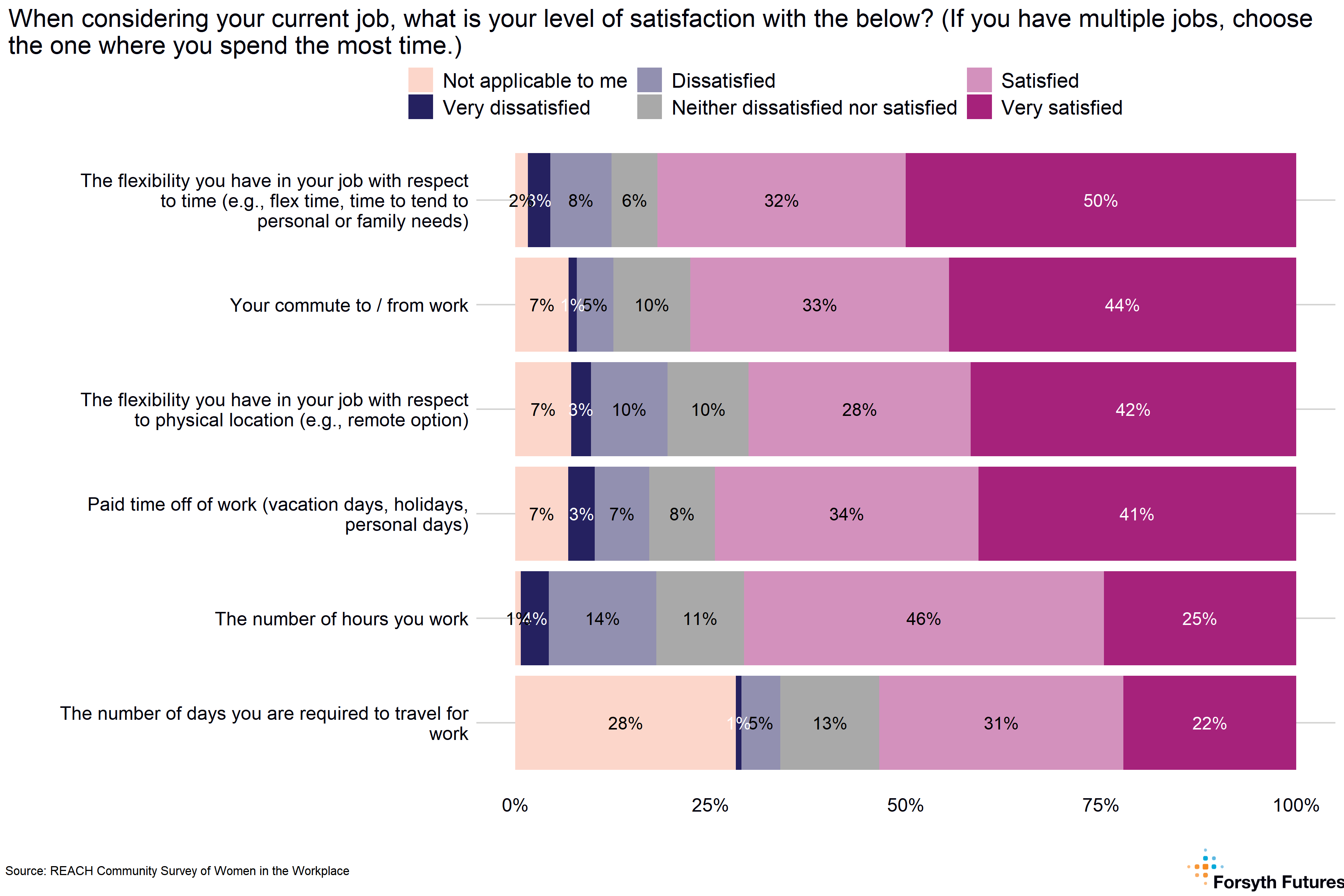
Overall, women reported high levels of satisfaction with their job including their commute to work, paid time off, and their job flexibility regarding time (e.g., flextime or personal time) and space (e.g., remote option). The highest level of dissatisfaction was with hours worked, but overall satisfaction levels were higher than not.
According to McKinsey’s ‘Women in the Workplace’ study, 61% of women would prefer to work mostly remotely, and women who work where they please are more satisfied with their job (81%) than women who do not have a choice (61%). In the Community Survey of Women in the Workplace, 15% of women reported they typically work remotely (See Working Location), and 70% of women reported they were either satisfied or very satisfied with the flexibility they have in terms of working location.
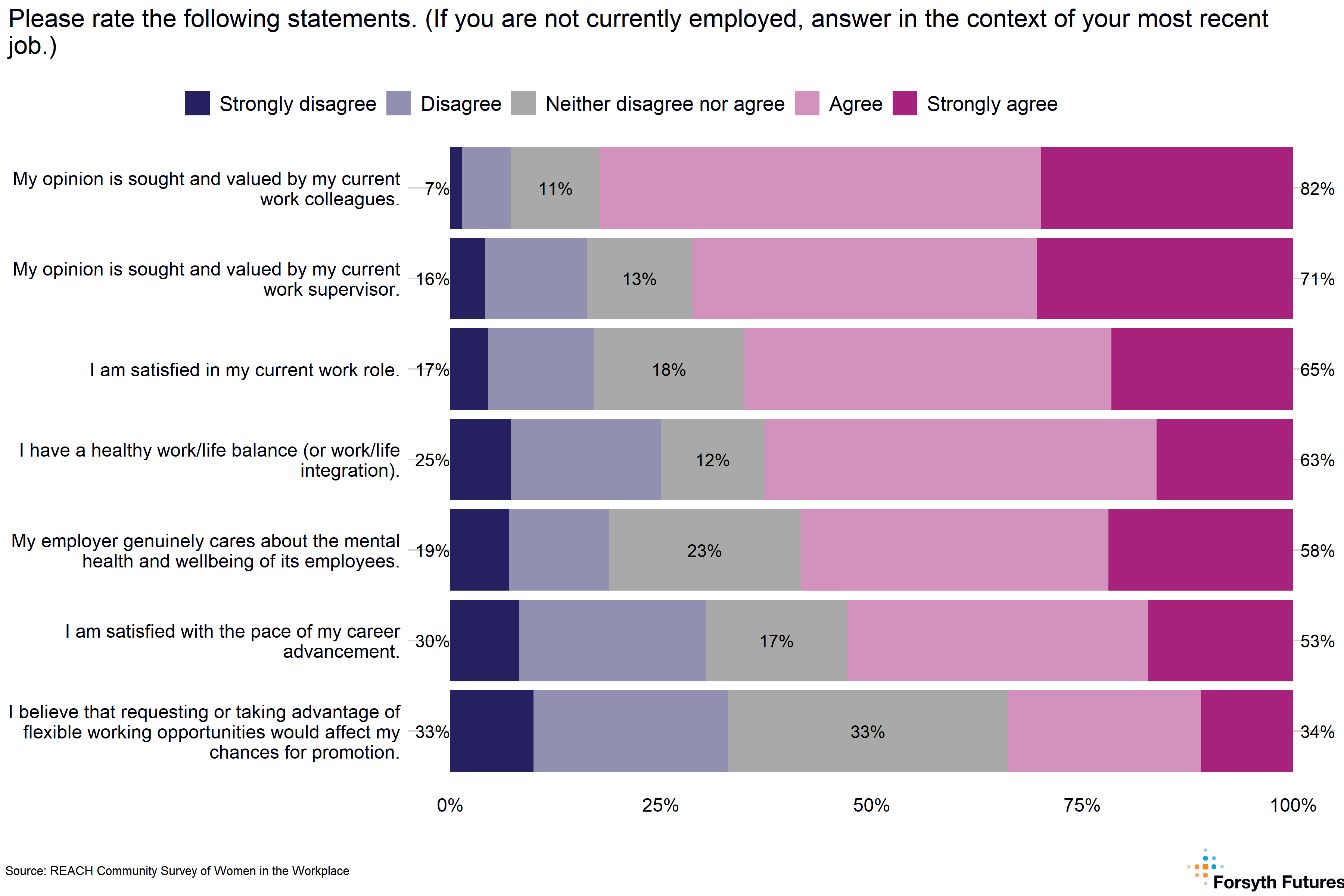 Note: This graph displays the summarized percentages of the bottom two response categories (Disagree and Strongly disagree) and the top two response categories (Agree and Strongly agree).
Note: This graph displays the summarized percentages of the bottom two response categories (Disagree and Strongly disagree) and the top two response categories (Agree and Strongly agree).
The majority of women in this survey agreed or strongly agreed that they were satisfied with their current work role (65%) and their work-life balance (63%). In contrast, 17% of women disagreed that they were satisfied with their work role, and 25% disagreed with the statement on work-life balance. The ‘Women @ Work’ study by Deloitte reported about one-quarter (27%) of women rate their job satisfaction as poor or very poor and another 47% report their work-life balance as poor or extremely poor.
In the same Deloitte study, 40% of women reported that their career was not progressing as quickly as they would like, while 30% of women in this study disagreed that they were satisfied with their pace of advancement.
While the majority of women previously indicated being satisfied with their flexibility at work, this plot shows that about 34% of women agree or strongly agree that they would face a career penalty if they requested or took advantage of flexible work opportunities. In contrast, 94% of women in the Deloitte study believed they would face a career penalty.
6.3.5 Workplace Equity Satisfaction
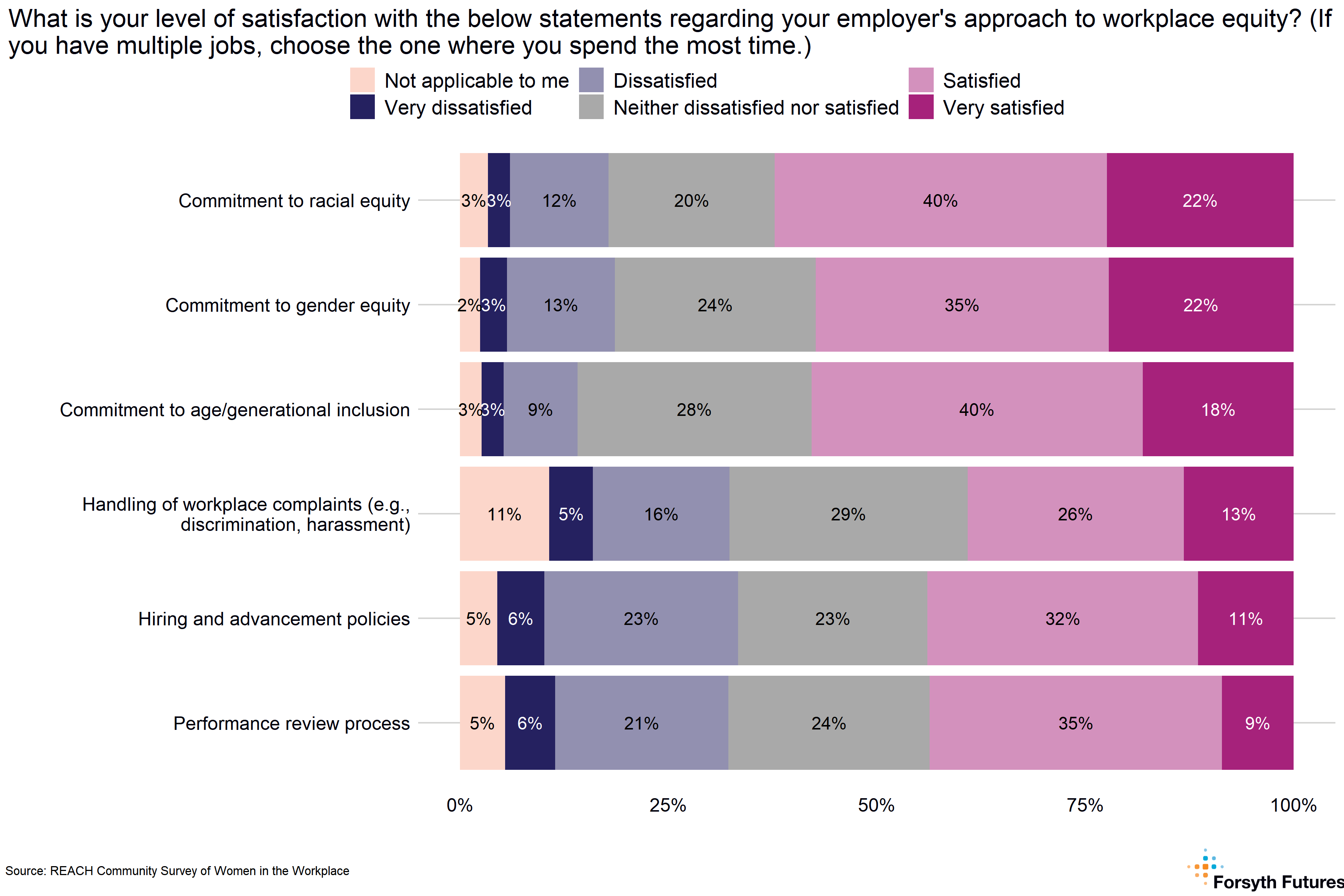
Respondents were asked about their employer’s approach to workplace equity, and most respondents were satisfied (40%) or very satisfied (22%) with their employer’s commitment to racial equity. Women were less satisfied with their employer’s hiring practices, advancement practices, and performance review process.
6.3.6 Burned Out
About 83% of women reported feeling burned out at least sometimes over the past few months. In contrast, according to the study from McKinsey 43% of women leaders are burned out.
6.4 Satisfaction with Benefits
6.4.1 Introduction
This section assesses how women feel about workplace benefits within two broad categories. The first category covers schedule flexibility. The second captures broader benefits including health care, child care, parental leave, and paid time off.
6.4.2 Key Findings
- Responding women ranked time / schedule flexibility higher than the ability to work remotely.
- Among the broader benefits, affordable medical insurance coverage, mental health coverage, and professional development opportunities were ranked the highest.
- The lowest ranked benefits were reduced hours, job share program, on-site child care, and fertility treatment coverage.
6.4.3 Workplace Flexibility Benefits
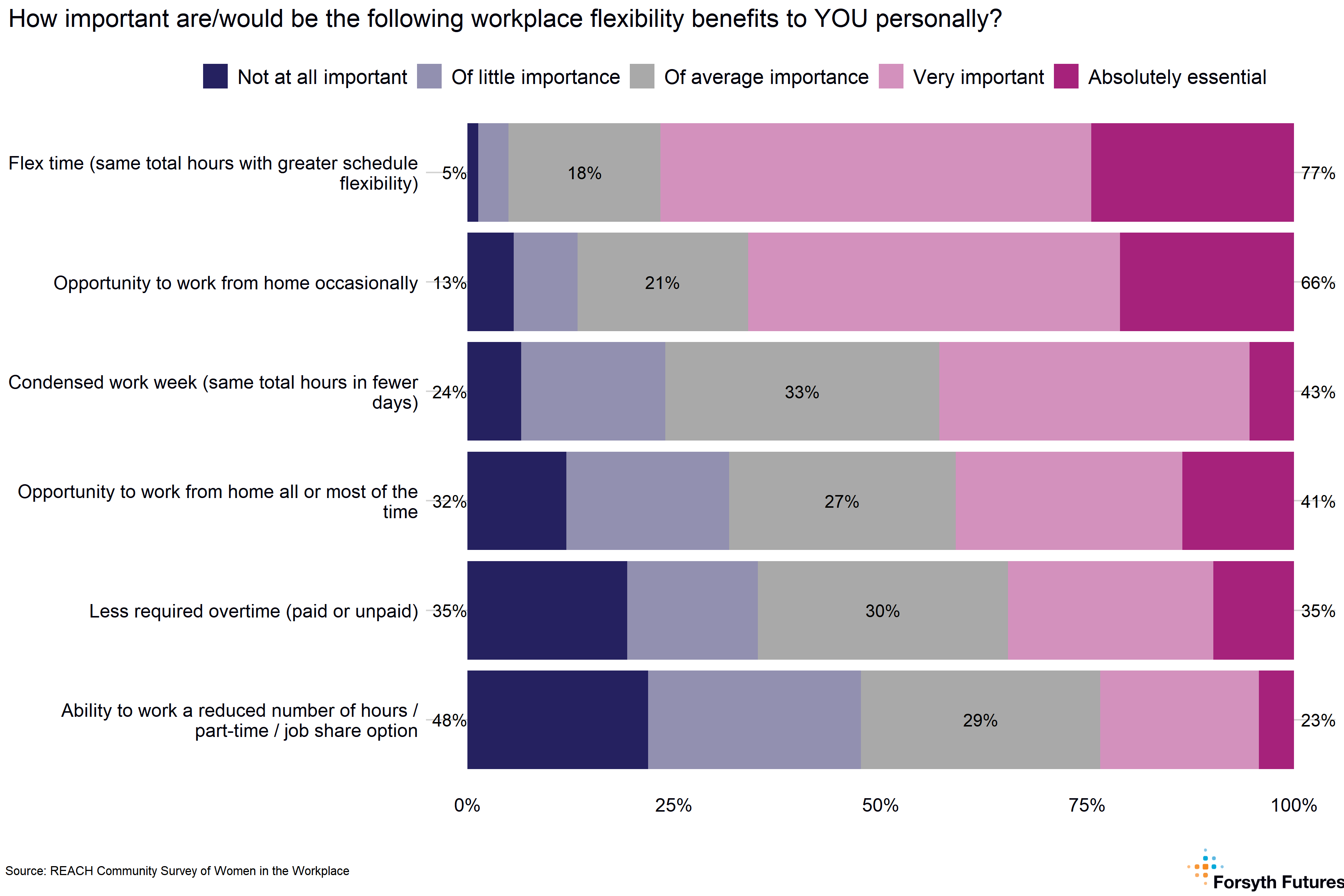 Note: This graph displays the summarized percentages of the bottom two response categories (Not at all important and Of little importance) and the top two response categories (Very important and Absolutely essential).
Note: This graph displays the summarized percentages of the bottom two response categories (Not at all important and Of little importance) and the top two response categories (Very important and Absolutely essential).
The majority of responding women (77%) indicated that flex time is very important or absolutely essential to them. Two thirds (66%) said the opportunity to work from home occasionally was very important or absolutely essential. 41% said the ability to work from home all or most of the time was very important or absolutely essential. 76% indicated that a condensed work week was of average or greater importance. Reducing hours, working part-time, or using a job share option were of least importance overall.
6.4.4 Workplace Benefits
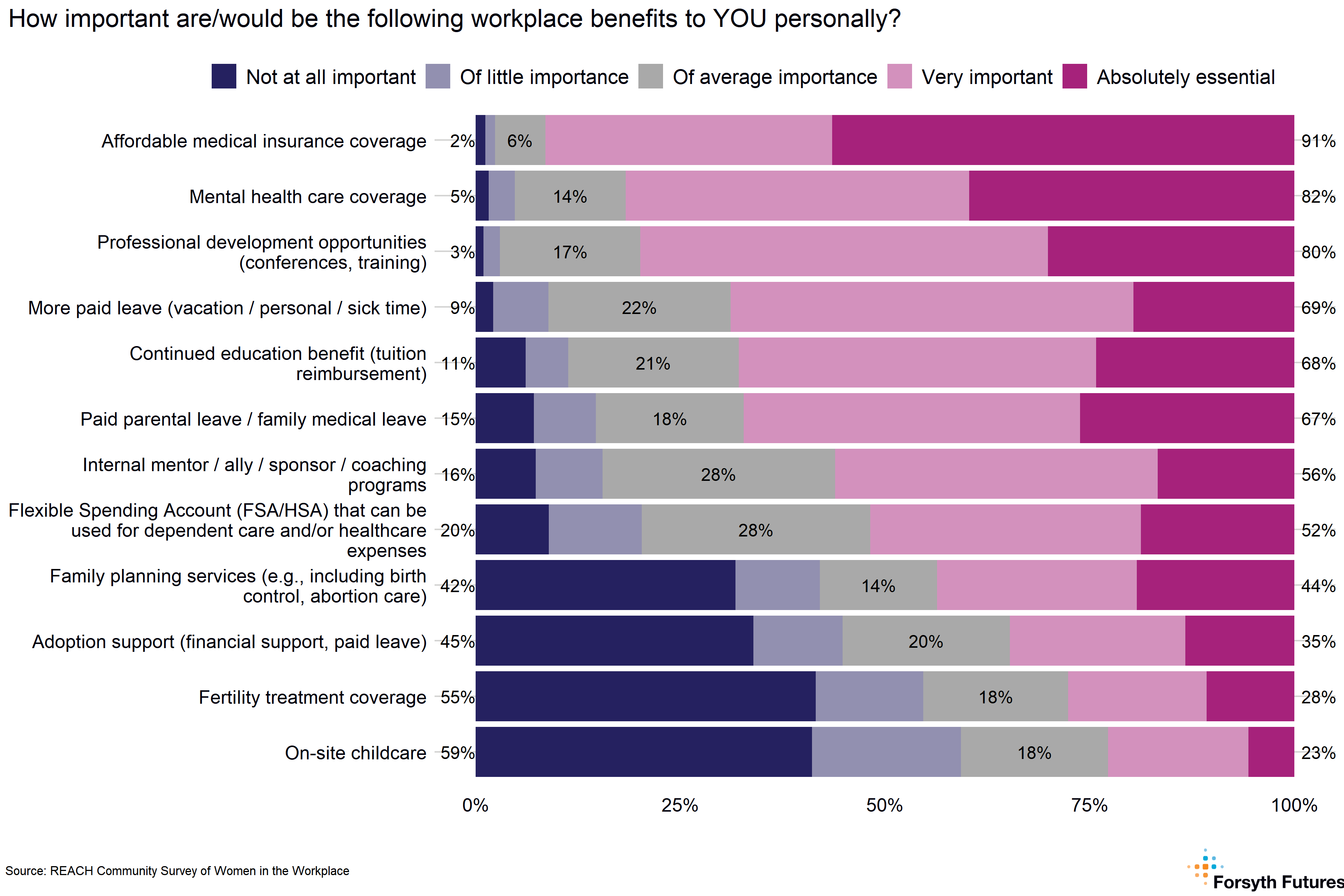 Note: This graph displays the summarized percentages of the bottom two response categories (Not at all important and Of little importance) and the top two response categories (Very important and Absolutely essential).
Note: This graph displays the summarized percentages of the bottom two response categories (Not at all important and Of little importance) and the top two response categories (Very important and Absolutely essential).
The overwhelming majority (91%) of women said that affordable health care insurance was a very important/absolutely essential benefit to them personally. The next two highest-rated benefits were mental health coverage (82%) and professional development opportunities (80%). The lowest-ranking benefits were on-site child care (59%) and fertility treatment coverage (55%).
6.5 Discrimination
6.5.1 Introduction
Women were asked to identify from a series of statements if they witnessed or directly experienced ageism, bullying, gender discrimination, and/or sexual harassment at any time during their career. Respondents could select all statements that applied to them or indicate that none were true.
6.5.2 Key Findings
- Women were more likely to report witnessing ageism, bullying, gender discrimination, and sexual harassment than experiencing it directly.
- More than half of responding women reported witnessing bullying in the workplace. About a quarter of women surveyed reported not experiencing or witnessing any of those forms of discrimination.
6.6 Factors Influencing Career Advancement and Changing Careers
6.6.1 Introduction
This section assesses which factors would most influence each respondent’s decision to change jobs and which factors have positively or negatively affected her career advancement.
6.6.2 Key Findings
- Work culture and higher salary/pay were the most common factors identified by women as very important or absolutely essential for a potential job change.
- Gender/gender identity and childcare responsibilities were the most common factors identified as having a negative or somewhat negative impact on career advancement.
6.6.3 Factors Influencing Job Change
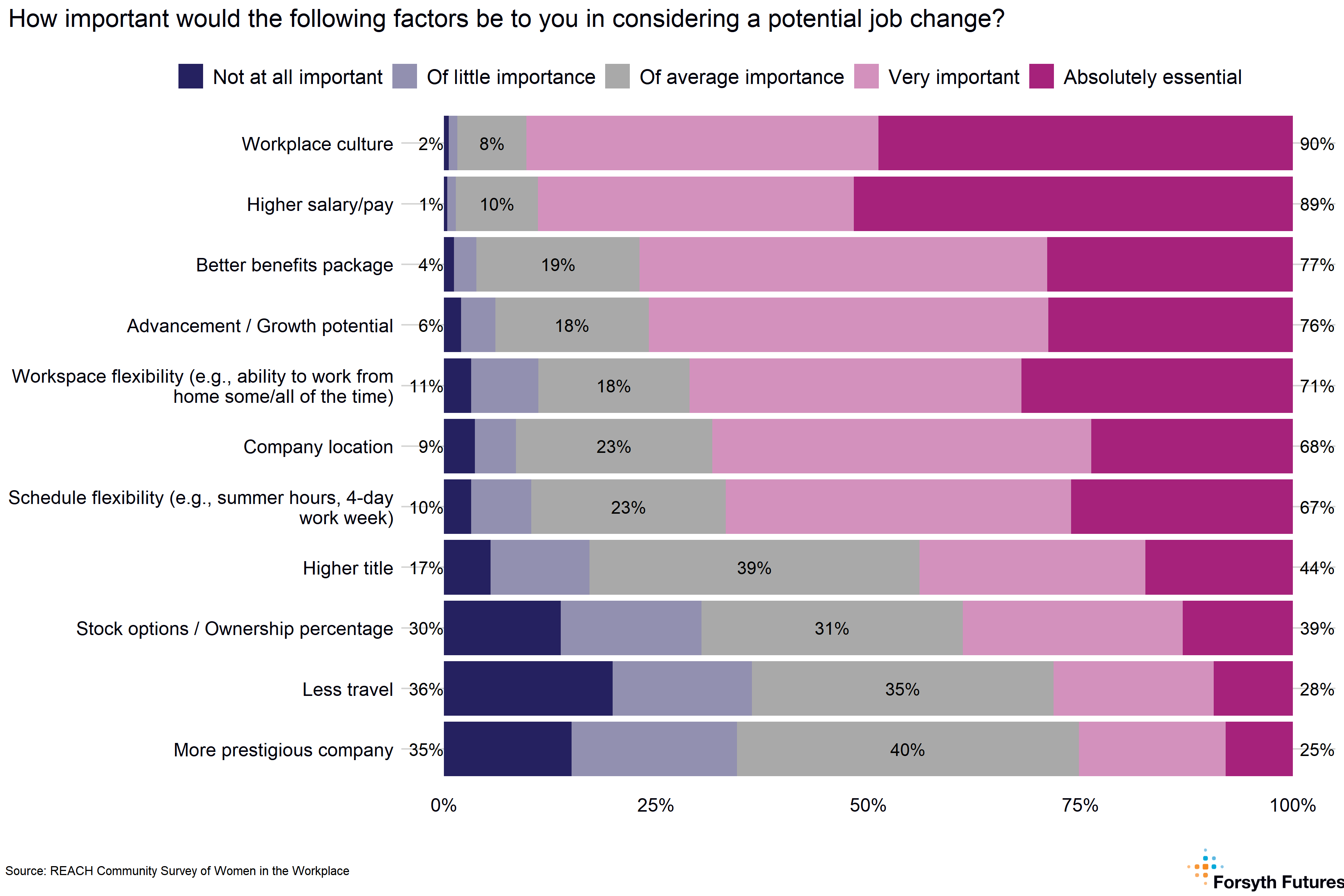 Note: This graph displays the summarized percentages of the bottom two response categories (Not at all important and Of little importance) and the top two response categories (Very important and Absolutely essential).
Note: This graph displays the summarized percentages of the bottom two response categories (Not at all important and Of little importance) and the top two response categories (Very important and Absolutely essential).
Women reported that workplace culture (90%) and higher salary/pay (89%) were very important/absolute essential factors for any potential job change. Less travel (36%) and working for a more prestigious company (35%) were considered the least important factors when considering a job change.
6.6.4 Factors Influencing Career Advancement
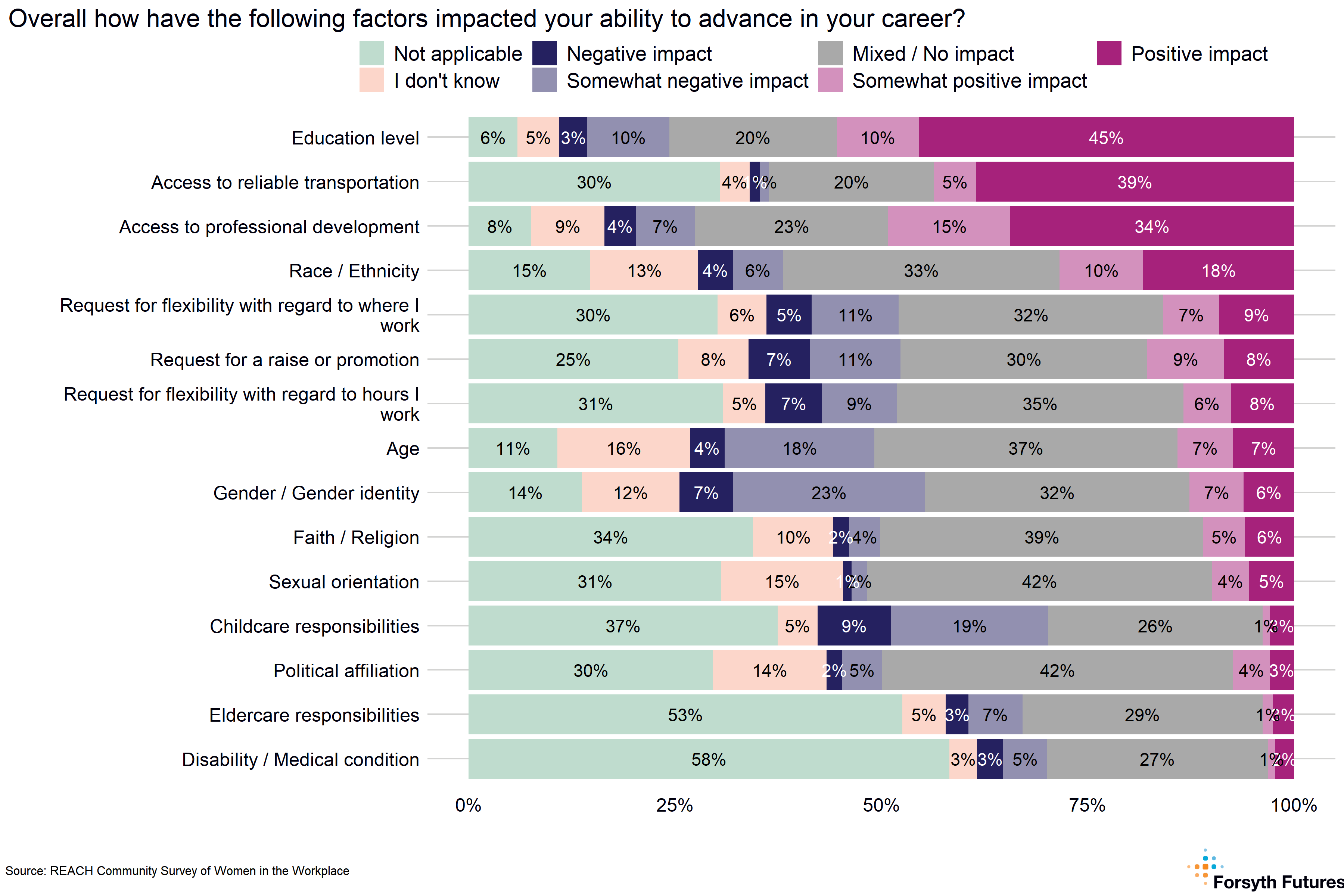
The factors identified as having the most positive impact on women’s career advancement were: access to professional development (49%), access to reliable transportation (44%), and their education level (55%). The factors with the most negative impact on career advancement included gender/gender identity (30%) and childcare responsibilities (28%). More than half of women reported their career advancement has not been impacted by a disability/medical condition (58%) or by eldercare responsibilities (53%).
